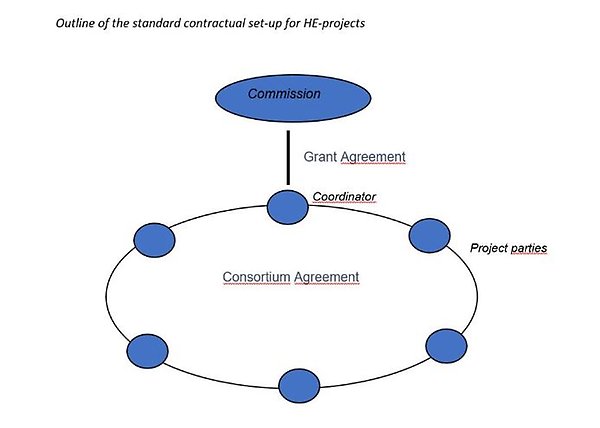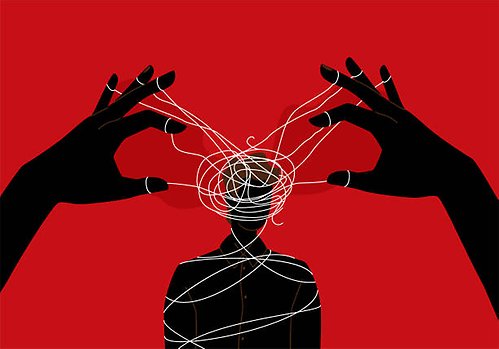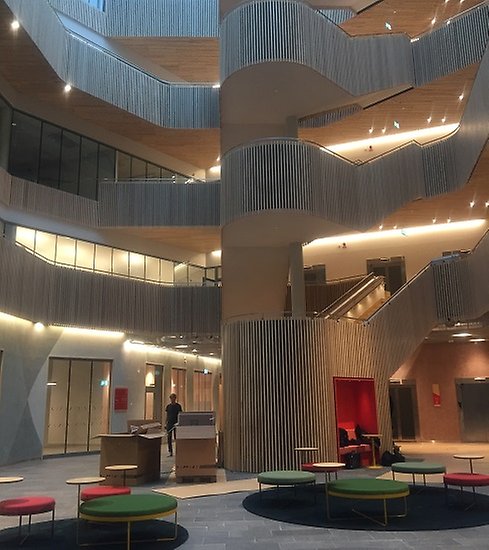Horizon Europe and research results
Horizon Europe is a program from the European Commission for research and innovation that is running between 2021 and 2027 with a budget of 95,5 billion euro.
Contractual set-up within Horizon Europe
In general, a Horizon Europe-project (“HE-project”) is carried out by a consortium of academic and private partners. The funding terms follows from an agreement between the EU-commission and the consortium, the grant agreement. The grant agreement is complemented by a consortium agreement, which also regulates further matters in between the collaboration partners. It is common that the consortium agreement is based in the DESCA-template, a template developed for EU-projects that has become widely accepted within Europe.
The grant agreement includes an annex 5, which contains the main part of the terms for project results and related obligations. As opposed to the main contractual document, annex 5 is specific for each project and the terms can therefore differ between HE-projects.
The following is based on the template wording currently available, which the Legal Affairs Division foresee will be applicable for most projects that the university will participate in. It should be noted that the grant terms (i.e. the grant agreement) will always apply before any contractual terms agreed in between the parties (i.e. the consortium agreement) in case the consortium agreement includes anything that is in conflict with the grant agreement.

Contractual terms relating to Background Knowledge and Project Results
HE-projects distinguish between knowledge developed outside the project and that parties contribute to the project (Background) and knowledge generated within the project (Results).
It is cricial to understand that it is Uppsala University that is the beneficiary of the funding and a party to the HE-project and hence not the department or the researcher/research group. Consequently, it is the university’s responsibility to fulfil the obligations described below. Within Uppsala University, this responsibility is delegated to the department involved, in practice the head of department that has approved the HE-project. The head can of course distribute practical work tasks in relation to these matters within its department.
Background knowledge (Background)
Background knowledge is knowledge available to a party that has been developed outside the project and which the party contributes to the project. To contribute Background to a HE-project the contributing party usually lists the Background in an attachment to the consortium agreement. By contributing Background, the contributing party accepts that other project parties may use the Background for work within the project and that other project parties may request licenses to use the Background outside the project if needed to exploit their own Results. This is the case as long as the contributing party has not expressly excluded the contributed Background from other parties use or from additional licenses.
To consider in regard of Background knowledge:Contributing Background to a HE-project means that the university grants licenses to the other project parties to use the Background. This can in some cases include commercial licenses. The department needs to consider a/ who owns the Background that is to be contributed and b/ if the university has the possibility to grant licenses that follow from the funding terms and the consortium agreement.It should be noted that Background can be the property of an individual researcher at the university as a consequence of the Swedish professors’ privilege.
Results
Results are new knowledge generated within the project. The funding terms entail obligations for the university related to the Results. The other project parties may also use the Results correspondingly as with Background, including requesting licenses when needed to exploit their own Results.
The following is a short overview of the university’s obligations in relation to the Results that follow from the funding terms.
Ownership of Results
Uppsala University applies the professor’s privilege

Transfer of Results
The party may transfer the ownership.

Protection of Results
Each project party is obligated to examine the possibility to protect its Results

Exploitation of Results
Each project party is obligated to exploit its Results

Report back on Results
Important to clarify whose responsibility it is to declare Results

To employ UU RIP AB
To employ UU RIP AB and costs for this

Help and contact
Where can I get help?

